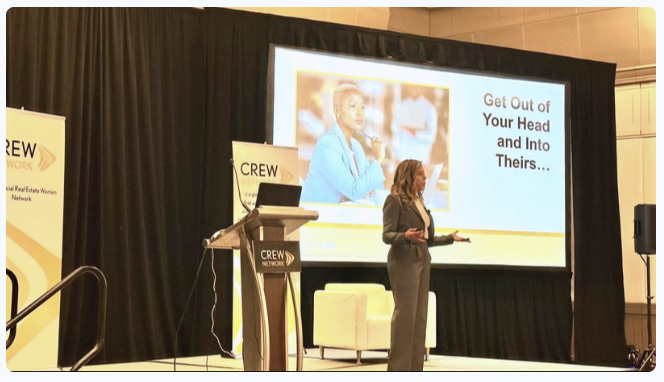1:1 and Cohort Private Coaching
As a renowned Certified High Performance Coach, Sheryl offers personalized 1:1 and exclusive cohort private coaching that empowers female leaders with science-backed and transformative Mental Toughness and High Performance strategies and insights—fostering bold, decisive leadership and enhanced influence for impactful, long-term success.
LEARN MORE >>Speaking and Training Events
Sheryl works with businesses and organizations that want to drive sustained, breakthrough-level High Performance. Her dynamic, results-driven presentations, training workshops, and group talks on Mental Toughness have deeply inspired and enlightened audiences at Google Ventures, SHRM, B of A, Microsoft, VMware, Jabra, and Women in Cloud, to name a few.
LEARN MORE >>NEW BOOK: Available Now!
Sheryl's new book, The Fearless Female Leader, will unlock what’s already inside you but inaccessible. It will help you gain clarity on an aspirational level of who you are, how you want to be remembered, and how you’d like to show up in the moments that matter most. You’ll also learn to build the confidence and science-backed influence to speak up and be heard.
ORDER NOW >>Enterprise Digital Journey
Developed with a proven framework, the transformational Fearless Female Leadership Journey (digital curriculum) empowers and equips women to leverage their authentic unique gifts and experience to achieve higher levels of team, talent, and business impact. Drive sustainable better engagement, retention, innovation, and measurable profitability.
LEARN MORE >>Get a Peek Into the Fearless Female Leadership Enterprise Digital Journey:
- Empower the female leaders in your company to drive greater impact in 2025 and a plan to make it happen
- Give them proven tools to gain clarity, up-level confidence and build strategic influence with leadership and customers
- Enable them to rapidly apply Sheryl’s powerful, life-changing, science-backed curriculum so they can gain buy in and move key initiatives forward
- View the Fearless Female Leadership Enterprise Digital Journey lesson summaries
Let's make 2025 your company's best year.
Experience it today with a complimentary digital lesson
What People Say About The Fearless Female Leadership Program

Gavriella Schuster
Former Corporate VP, Microsoft, CEO, Board Member
"The Fearless Female Leadership proven process prepares female leaders and emerging leaders for the marathon ahead and not just for a short-term sprint. Systemic change takes work, support, and it takes leadership. Sheryl is driving that change across the spectrum of business.”

Amy Bunszel
EVP, Architecture, Engineering & Construction Design, Autodesk
"Fearless Female Leadership is well-thought out, innovative and impactful. Sheryl provides clear actionable take-aways on how to be more mentally tough and influential, especially in high-pressure situations."

Christina West
Senior Partner | Executive Team, OTG Consulting
"Sheryl and her Fearless Female Leadership system has helped me go from playing smaller than I could in terms of my title and area of influence, despite a high level of expertise... to recognizing my title as the CRO and speaking up about it. I now own my worth, and I’m positioned accurately with more confidence than ever. This makes me feel much more powerful and in control of my destiny. This is a win-win for myself and my organization."

Kristy Wallace
Former CEO, Ellevate Network, Advisor, Board Member
"I think we are all looking to align our purpose and work for the greater community and world. Sheryl’s Fearless Female Leadership system contains a roadmap to help us gain clarity on what’s next and drive even greater change for our companies and beyond."
About Sheryl Kline, M.A. CHPC
I’m a mother of 3, and Mental Toughness and High-Performance executive coach to some of the most prolific women leaders in San Francisco, Silicon Valley, and across the country. I’m also a speaker, best-selling author, CEO/Founder of The Zone Lab, LLC as well as a fierce believer in the light and power within each one of us.
For the last 25 years, I have been working with world-class athletes, Olympians, female leaders, and their teams to build Olympic-like confidence and FBI level negotiation strategies. This is so they can influence their leadership, peers, and board to be heard, valued, and respected agents of change.
I have also sat on panels and conducted local and global mental toughness and high performance workshops at Commvault, WIT Network, Google Ventures, Jabra, Insight, Oracle, Autodesk, Athena Alliance, Microsoft, Capital One, Pixar, VMware, Berkeley Haas School of Business, SHRM, CREW, Women in Cloud, Schnitzer Properties, State Street Global Advisors, and Bank of America to name a few.
WATCH MY SIZZLE REEL >>
SPEAK UP, BE HEARD, AND UNLOCK YOUR NEXT LEVEL OF IMPACT!
Sign up for the Fearless Female Leadership Newsletter and join a community where ambition meets action.
Each week you'll receive the latest mental toughness and high-performance articles, videos, interviews, tips, and much more, all tailored to empower you on your journey to leadership excellence. Each newsletter is packed with valuable insights and practical strategies designed to help you navigate challenges with confidence and elevate your leadership skills. Don't miss out on this opportunity to transform your potential into performance.
Sign up today for FREE and take the first step towards becoming a more fearless and effective leader.
Join Our Fearless Female
Leadership Community
Don't worry, we'll never send spam.
Read the Fearless Female Leadership Blog
with the Latest Mental Toughness and High Performance Articles, Videos, Tips, and More!
Listen to a Recent Fearless Female Leadership Podcast
Contact Us
SCHEDULE A FREE CONSULTATION CALL
Find out if the Fearless Female Leadership Enterprise Journey Edition, coaching or speaking engagements are right for you, your department, or your team.
Book a time to speak with Sheryl via phone or Zoom video conference.
Sheryl Kline, M.A. CHPC
The Zone Lab, LLC
[email protected]
(619) 693-7505
www.sherylkline.com
Send a Message to
Sheryl Kline, M.A. CHPC
Don't worry, we'll never send spam.














